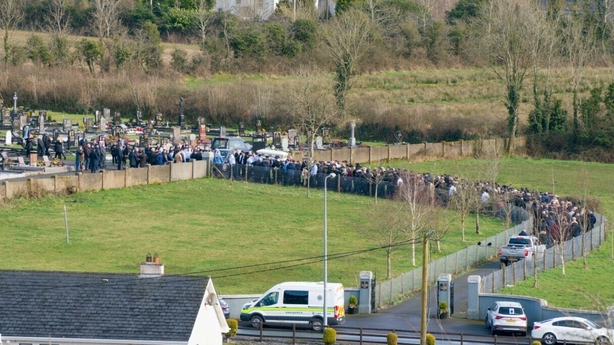Ireland is at a "delicate point" and now is not the time for people to relax public health measures, the Chair of the National Public Health Emergency Team Epidemiological Modelling Advisory Group has warned.
Professor Philip Nolan said while extraordinary progress has been made, the prevalence of Covid-19 is very high and said the virus will exploit any chance to destroy that progress.
NPHET said it had noted a slight increase in the seven-day average of Covid-19 cases in recent days.
It said it is concerned that any further increase in the mobility of people could make the situation worse.
Speaking on RTÉ's Morning Ireland, Prof Nolan said he is worried that any easing of public health measures by people over the next while will "squander" the good work done to suppress the virus.
He added: "This is not the time to have mixing between households and not the time to be going back to the workplace unless it is essential."
Prof Nolan said Ireland has had 52 weeks of living with the virus, but said with continued efforts, in 10 weeks' time Ireland will be in quite a different scenario and again 10 weeks after that.
"In the grand scheme of things, it is a matter of weeks before we can do more things because of the progression of the vaccination [roll-out]," he said.
Prof Nolan said the reopening of schools is going very well and although it is early days, he said "the reopening of schools is not driving the pandemic", as very few cases have been reported.
The head of the ESRI's Behavioural Research Unit, Professor Pete Lunn has warned that "we are at an absolutely crucial time now".
Prof Lunn told RTÉ's News at One that there is "slippage" from a minority of the population, and that this minority are "placing the rest of us at risk."
"We are at an absolutely crucial time now that we stick the course and that the minority curb their behavior so that that we can get these numbers down."
He said if control of the disease is lost, "the hope that we can enjoy some kind of a free summer starts to fade".

Mr Lunn said if the minority to do not curb their behaviour there is a risk that the third wave will not be the last.
He said throughout the pandemic, people's concern about how likely they are to contract the diseases has been the primary driver of their behavior.
Prof Lunn said there is "potentially an illusion" that Ireland has a relatively low level of disease, due to the case numbers dropping from an extremely high level.
NPHET said overall case numbers have unexpectedly gone up over the past two days and it is watching the situation carefully.
It is worried about the proportion of people returning to the workplace which has now reached 60%, up from 50% in January, and that other mobility indicators that are also on the rise.
Meanwhile, a spokesperson for Pavee Point said it is disappointing that some people are turning out in large numbers at funerals.
Martin Collins said the vast majority of Travellers are following the guidelines and said Pavee Point has always been clear that everyone needs to adhere to the public health measures.
He said he understands how hard it is for people not to be allowed attend funerals beyond the ten person limit currently in place under Level 5 restrictions, but it is not acceptable to get involved in large gatherings.
He said "cultural norms" have to take a back seat during the current restrictions.

His comments come after a large funeral took place in Carrick-on-Shannon in Co Leitrim yesterday.
Gardaí say two people were arrested under the public order act while over 80 fines were issued for breaches of the public health regulations following the funeral.
Yesterday, the Deputy Chief Medical Officer appealed to parents not to see the return of the remaining primary school classes next Monday as a signal to return to work.
Dr Ronan Glynn also warned that if employers are asking people who do not need to go to work to return to work, they are putting all that has been gained at risk.
At 8pm yesterday, 341 Covid-19 patients were being treated in hospital, including 87 people in intensive care.
There was also a very sharp fall in the incidence of Covid-19 in over 85-year-olds not resident in nursing homes last week.
It was down by 50% compared with the previous week - a clear benefit of the vaccination rollout by GPs in the community over the previous three weeks.
Separately the National Immunisation Advisory Committee has recommended to NPHET that the AstraZeneca vaccine should now be given to older age groups on foot of new evidence about its effectiveness.
Additional reporting George Lee

